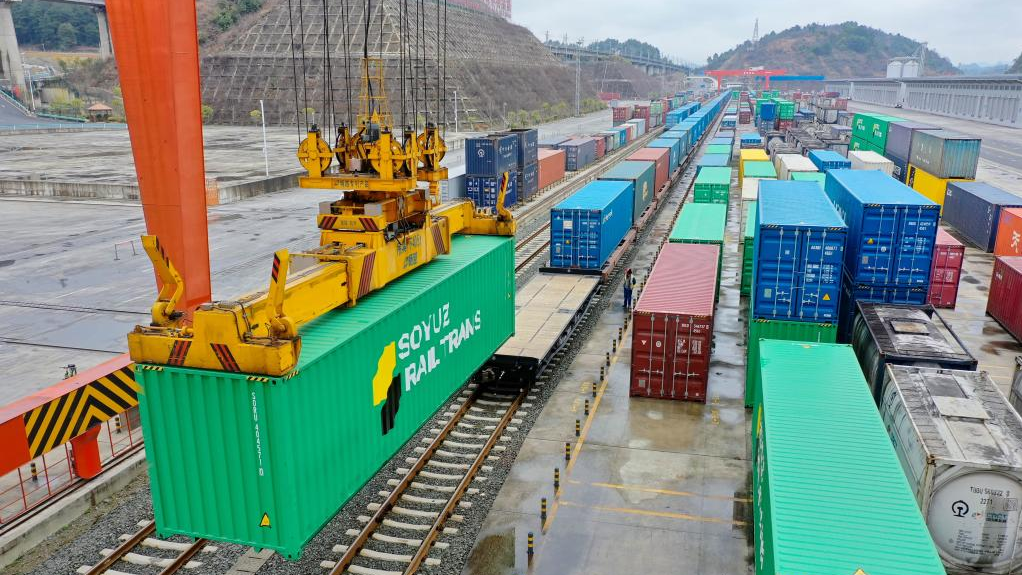
A China-Europe freight train loading containers at Dulaying Station in Guiyang, southwest China's Guizhou Province, February 9, 2023. /Xinhua
A China-Europe freight train loading containers at Dulaying Station in Guiyang, southwest China's Guizhou Province, February 9, 2023. /Xinhua
Editor's note: Liu Chunsheng is an associate professor at the Central University of Finance and Economics. The article reflects the author's opinion, and not necessarily the views of CGTN.
China's economic performance in 2022 has shown its resilience, with the country recording a 3 percent year-on-year economic growth in a challenging economic environment. Despite the COVID-19 pandemic, China could maintain its position as one of the world's largest economies and major contributor to global growth.
Nonetheless, there are also challenges facing China's economy in 2023, such as ongoing global economic uncertainty and increasing competition from other countries. In order to maintain its strong economic performance, it's crucial for China to address these challenges and continue investing in the development of its industries and infrastructure.
The recent Central Economic Work Conference in China has called for raising domestic demand in driving economic development. This focus is a positive step towards achieving sustainable and balanced growth in China's economy.
The conference's emphasis on domestic demand is also in line with the Chinese government's efforts, by which Beijing is creating a more stable and self-sufficient economy to reduce its dependence on external factors.
The conference's focus on domestic demand is also a response to the ongoing global economic uncertainty and its impact on China's exports. The government hopes to create new opportunities for industries and to provide a buffer against external shocks to the economy.
Expanding domestic demand as an important driver of China's economy in recent years has brought new opportunities and challenges to various industries. It has a significant impact on the competitiveness and security of China's industrial and supply chains.
As domestic demand continues to grow, the scale of the industrial chain will expand, leading to increased competition and the development of new industries. Rising competition will lead to the optimization of the industrial structure, upgrades to product quality, and the reduction of production costs.

People shop at a shopping mall in Changchun, northeast China's Jilin Province, January 23, 2023. /Xinhua
People shop at a shopping mall in Changchun, northeast China's Jilin Province, January 23, 2023. /Xinhua
Moreover, rising domestic demand can promote the development of new technologies, as well as the upgrading of existing technologies. This can improve security of the industrial chain, by reducing its dependence on imported technologies and products. The development of new technologies can increase the competitiveness of domestic industries, by providing them with a competitive advantage in the global market.
Boosting domestic demand will improve the supply chain management of domestic industries, since it will require improved supply chain management in order to meet consumers' needs. This could reduce supply chain disruptions. In addition, the improvement of supply chain management can increase efficiency of domestic industries.
Furthermore, rising domestic demand would promote the development of China's small and medium-sized enterprises (SMEs), which play a crucial role in the industrial chain. SMEs often face many challenges, such as limited access to finance and technology, and a lack of market access. Nevertheless, increased domestic demand will offer new opportunities for SMEs and improve their competitiveness and security. In particular, while also creating new markets for SMEs, and provide them with new sources of financing.
Accordingly, China's commitment to enhancing its domestic demand is an encouraging sign for the country's economic future. Rising domestic demand will boost its growth in the following years, driven by factors, including increased disposable income, improved access to consumer goods and services, and a growing middle class. China is becoming more self-sufficient in key industries, such as technology and high-end manufacturing. By developing a strong domestic market for these industries, China aims to reduce its dependence on foreign markets and increase its competitiveness in the global economy.
As one of the largest economies, enhancing domestic demand never means China will close its door. By prioritizing domestic demand, it will help to drive economic growth and to safeguard its industries chains. Meanwhile, by maintaining strong connections with the global economy, it will ensure that China remains a crucial player in the international economic landscape.
(If you want to contribute and have specific expertise, please contact us at opinions@cgtn.com. Follow @thouse_opinions on Twitter to discover the latest commentaries in the CGTN Opinion Section.)